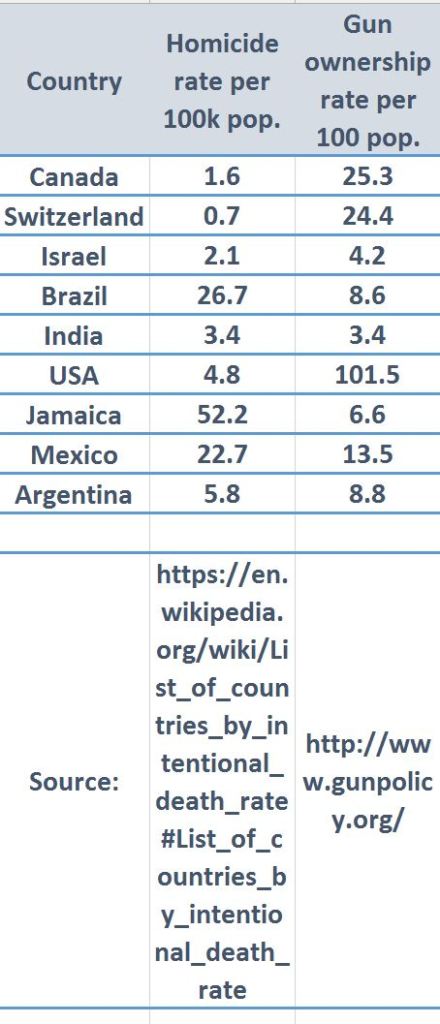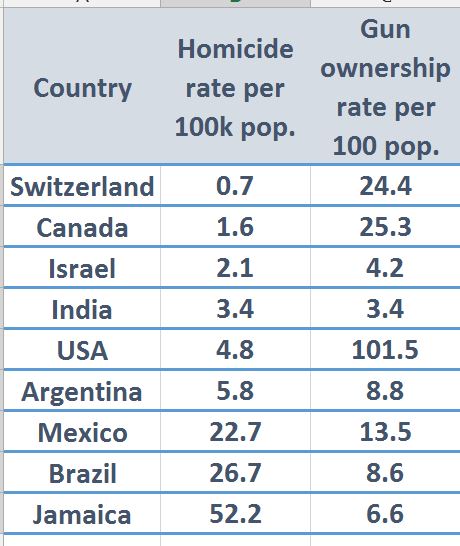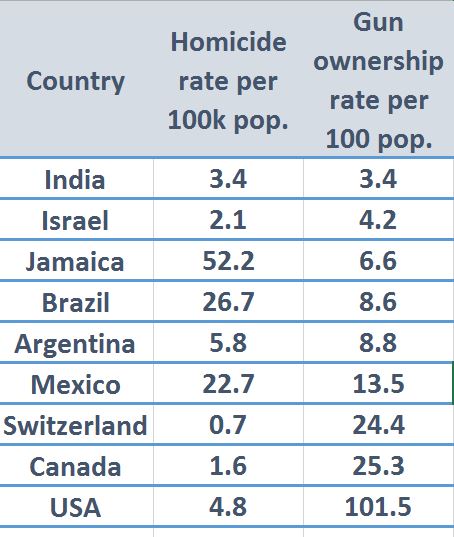Do you see a pattern? I don’t. Nine countries selected semi-randomly:

Then organized by homicide rate:

Then organized by gun ownership rate:

Let’s think sadly about those who were injured and lost their lives. Let’s think angrily about the evil man who killed them. And then let’s also think sophisticatedly about the multiple influences and causes of homicide.

How do you get accurate info about gun ownership? If some drugged out nutcase on the street gets a gun from his bro, without registering it, who submits that info for a survey?? I dislike propaganda such as these “statistical surveys”. They mislead people and claim it as true stats. It’s like putting out statistics on how many virgins there are in the world. It will never be honest or verifiable.
The “intentional death rate” statistics (your data source) grossly misrepresents deaths by guns in USA and other countries, the proper statistic is this one: https://en.m.wikipedia.org/wiki/List_of_countries_by_firearm-related_death_rate
(by the way, I’m pretty sure your numbers are about ANY murder, not just gun-related)
Using the right data, the USA is at 10.54 deaths per 100K inhabitants (2014 data), which incidentally is more than double what you found, and (much more telling) way above any “comparable” Western country (e.g., OECD countries).
Comparing the numbers you picked for these “semi-randomly” chosen countries is like comparing apples and oranges. It’s like claiming that gun ownership rate is the only controlling variable of the homicide rate, when it’s obvious that the countries you list have plenty of other differences impacting on number of homicides (e.g., wealth, wealth distribution, criminality, wars, education rate…).
So please, if you don’t see a pattern is because there is no gun-related pattern to be seen in the data you show. Restrict the numbers to OECD countries and I’m pretty sure you’ll see the pattern. This (old) article does it for you: https://www.nytimes.com/2016/06/14/upshot/compare-these-gun-death-rates-the-us-is-in-a-different-world.html
I understand you might be convinced that gun control would not solve the issue in the USA, but it’s not by using a straw man argument that you’re going to convince anybody who has a clue about statistics.
Hi Giovanni:
Re. your first paragraph: Yes, the header says homicides, not deaths by guns. My question (in part) is about understanding why and how people kill each other in general — and to question the immediate fixation many have with guns. So that is the right data for one of the questions I am pointing to.
Re. your third paragraph: The point exactly IS to compare apples and oranges and NOT to see guns as the only variable. That’s exactly what the data show: killings vary widely independently of gun-ownership rates, and that’s what we should be investigating.
Re. your fourth paragraph: One can of course restrict to only OECD countries, which is to make the economic variable one’s focus. Indeed there are patterns there. But again, why restrict to only one variable when others obviously are in play?
For example, I find it to be a step in the right direction to look at the wide, wide divergences within the USA’s sprawling mass of cultures and subcultures, as this data does: “Murders in US very concentrated: 54% of US counties in 2014 had zero murders, 2% of counties have 51% of the murders” (https://crimeresearch.org/2017/04/number-murders-county-54-us-counties-2014-zero-murders-69-1-murder/). That’s interesting because it suggests that it’s too crude to compare culturally diverse nations with culturally homogeneous nations, even when those nations have similar overall OECD or other economic status.
That’s to say, there are plenty of straw men out there to avoid.
Killing is necessity for all living things. Cows eat grass, grass have defenses to kill harmful microbes, and so on. We don’t count the living things we simply destroy or digest to stay healthy. In our relationships with one another on the other hand, we want to eliminate violence so those who want to can use their minds to create and produce, which evidently makes the world a better place. Liberals advocate the state’s job in that mission is to fight violence when it occurs. Collectivists advocate the state’s job is to be the only agent to use violence or the threat of it until all people everywhere lose their propensity of violence somehow. Left-wing collectivists want to reach that end by making people around administered role models. That is how we get the gun control arguments.
The gun control proponents don’t claim homicide will disappear if individuals don’t own guns. They claim in absence of gun ownership the playfield of homicides will be leveled. It is perfectly in line with their world view of formal equality and state monopoly. One can prove gun ownership doesn’t change anything about homicides because there are other ways of murder. It is their expectation that the individual must be disabled before anything “good” can happen.
Right-wing collectivism doesn’t show in this argument. To them, gun ownership is a form of all ownerships and it doesn’t matter in their worldview. Because it is not about the property rights. It is about who has the right to decide what to do with property and that is not the holder of it.